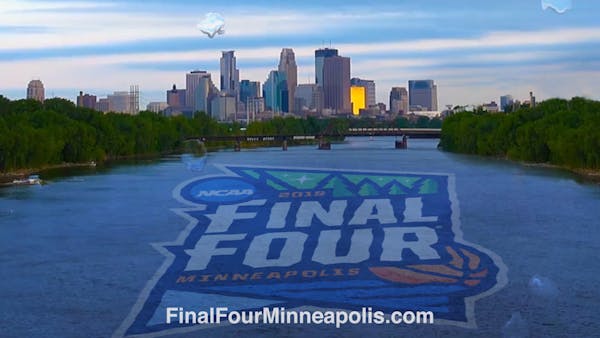Thousands of boisterous, banner-waving devotees are expected to fill Twin Cities streets when Super Bowl LII comes to town in February. Some might even stay for the game.
"Everybody knows there's going to be protests — they know what they're walking into here in the Twin Cities," said Sam Sanchez. His group, Twin Cities Coalition for Justice 4 Jamar, and others have promised a week of "resistance" leading up to the Feb. 4 game. The demonstrations would continue, he said, unless officials addressed the treatment of the homeless and police violence.
Super Bowls, like other major sporting events, have had a way of attracting protests of all stripes, said Dana R. Fisher, a professor at the University of Maryland.
"People tend to pick large events to protest where you can get a critical mass of people on the streets," said Fisher, who has studied the sociology of demonstrations for nearly two decades. "It's a great opportunity to get a lot of attention, because the eyes of the nation will be on the game."
More than 5,000 credentials were issued to U.S. and international media from print, television, radio and online outlets.
Hundreds rallied outside Houston's NRG Stadium during last year's Super Bowl weekend to denounce President Donald Trump's Muslim travel ban. Even in 1992 — the only other time that Minneapolis played host — some 3,000 people protested against the use of what they saw as racist mascots and nicknames by professional teams.
"I think there's more of an activist subculture here than there is in other major metropolitan areas," said Minneapolis attorney Jordan Kushner, who represented protesters charged after the Interstate 94 shutdown last year.
The threat of a transit workers' strike also hangs over the 10-day, star-studded extravaganza, which organizers say could draw more than a million visitors to the area.
"We've told management, we're telling our members: If we don't have a contract, we're not going to work the Super Bowl, we're going to go on strike, and that includes the whole 10-day event," said Mark Lawson, president of Amalgamated Transit Union Local 1005, which represents about 2,500 bus drivers, light-rail operators and other Metro Transit workers.
Last month, union members rejected a contract offer from the Metropolitan Council and authorized a strike, citing disagreement over proposed changes to work rules, outsourcing and security for bus drivers. Transit authorities have said they're confident a deal can be reached before the game.
Authorities would not discuss how they plan to handle potential Super Bowl-related protests, but insisted they're prepared for any scenario.
"Based on observations of recent Super Bowls, where any protests were minimal and peaceful, the MPD expects our approach, and our successful track record regarding peaceful demonstrations, to remain the same," said Minneapolis Police spokeswoman Sgt. Catherine Michal.
Security for the event will rival a presidential inauguration, officials said. Snipers will be on rooftops, while roving teams of officers will patrol the area around other events. Thousands of uniformed and plainclothes officers will be on duty, looking for signs of trouble.
Protesters, or anyone without a game ticket, will not be allowed into the secure perimeter around the stadium, stretching 2 ½ blocks in every direction, in the two days before the game.
But unlike at many other Super Bowl venues, surrounded by acres of asphalt in out-of-the-way locations, handling any protest that springs up could be complicated by the game's cramped urban setting.
Organizers don't seem too concerned.
"The Minnesota Super Bowl Host Committee's primary focus is on putting on a safe and successful Super Bowl festival where all Minnesotans are welcome and everyone is respected," spokesman Michael Howard said in a statement. He declined to address specific questions about whether there would be designated "free speech zones" — used at other major events to corral demonstrators into confined areas, often hundreds of yards from events. He referred further inquiries to Minneapolis police.
Bloomington Deputy Police Chief Mike Hartley said that his main concern is public safety but that he is willing to work with activists to allow them to express their First Amendment rights. The Mall of America will host some events.
"We've had enough [demonstrations] in Bloomington where we've got a way of going about them, where we always start with trying to work with protest organizers instead of against them," he said. "But ultimately, when we're talking about private property, there are rights involved with private property."
Despite recent crackdowns on protesters in some parts of the country, mega-events like the Super Bowl offer an irresistible platform for anyone looking to air his or her grievances, said Fisher, the sociology professor, pointing to the politically charged atmosphere surrounding football.
One advocacy group called Take a Knee Nation, which has been outspoken about police mistreatment of minorities, announced it would hold a two-day conference the weekend of the game, culminating in a rally protest near downtown Minneapolis on Feb. 4. Other groups have said the hoopla surrounding the game has revealed inequalities and tensions that existed long before the city was awarded the Super Bowl.
"A lot of things that people ask for help with, they're always saying: 'We don't have the funding, we don't have the funding, we don't have the funding,' but then all of a sudden for this weekend they have the funds to do everything — they have the funds to relocate the homeless, they have funds for security," said John Thompson, a local activist who has been outspoken about police brutality. "You probably will see me at the Super Bowl … with my knee down on the ground — and I'll be there by myself if I have to."
Libor Jany • 612-673-4064 Twitter: @StribJany

Former Hopkins basketball star transferring from Michigan to U

Can things get better for the Wild after a disappointing season?
NBA Playoffs 2024: Before Game 1s on Saturday, a pair of Game 7-type matchups on Friday

